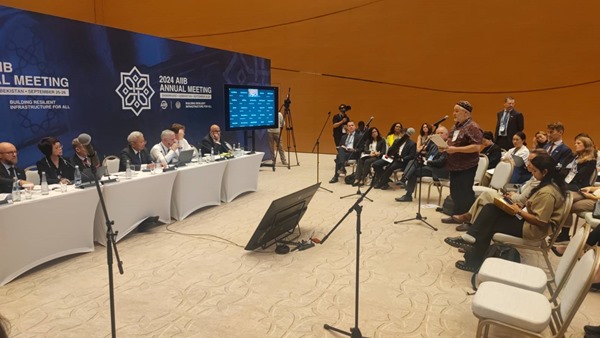The issue of financing the Rogun HPP construction in Tajikistan, which has dangerous negative impacts on natural ecosystems and local communities, emerged as the main project discussed in the dialogue between civil society organizations and the management of the Asian Infrastructure Investment Bank (AIIB) at the 9th Annual Meeting of AIIB Governors held last week in Samarkand.
Representatives of civil society organizations from around the world used every opportunity to convey their concerns about the environmental and social risks posed by the Rogun hydropower project envisioning erection of the world’s highest dam.
“The Asian Infrastructure Investment Bank and other financing organizations should not blindly support a poorly designed Soviet hydropower project that requires the relocation of 50,000 people, threatens UNESCO World Heritage sites and endangered species,” stated a special booklet that community organizations distributed to attendees of the AIIB annual meeting. – The Rogun hydropower project completely ignores the social and environmental impacts downstream of the Vakhsh cascade of hydropower plants in the Amu Darya River basin and delays the decarbonization of Central Asia for at least 15 years, making electricity less affordable for the poor.”
“The future of building Rogun is full of risks and uncertainties, so even people with opposing viewpoints have the same desire to complete this project as soon as possible with the least damage to nature and people,” Eugene Simonov, international coordinator of the Rivers without Boundaries International Coalition, said at a meeting with the AIIB leadership. – “We suggest that the banks consider alternative options for completing the construction of the Rogun hydropower plant using design solutions developed 10-15 years ago with a much lower height of the dam, which will reduce the flood zone, radically reduce the number of people to be resettled and reduce risks for the population and the UNESCO World heritage property downstream”.
Jin Liqun, President of the Asian Infrastructure Investment Bank, summed up the discussion between the public and bankers: “I understand the concerns you raise, and I intend to approach the World Bank and the Government of Tajikistan to work together to find ways to reduce the negative impacts of the Rogun hydropower plant – or at least fully offset them. We cannot afford to build dams that are as destructive to nature and people as they were 30 years ago.”
Now, the Rivers without Boundaries environmental coalition and other civil society organizations who participated in the AIIB Annual Meeting in Samarkand – hope that potential investors in the project will make an accurate assessment of the environmental, social and economic impacts of the Rogun hydropower plant and will revise the plan to complete construction of the dam in order to reduce and eliminate all major social and environmental risks.





